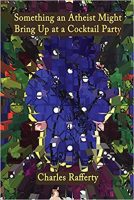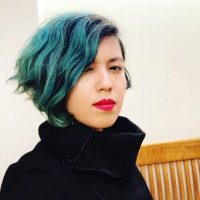May 25, 2018
Edited by David Sanders
Specimen Days
709—Aldhelm, Abbot of Malmesbury, Bishop of Sherborne. English poet and scholar (b. cica 639), dies.
1595—Valens Acidalius, German critic and poet (b. 1567)), dies.
1681—Pedro Calderón de la Barca, Spanish dramatist, poet and writer of the Spanish Golden Age, dies at 81
1830—Jules de Geyter, Belgian poet (International), is born.
1846—Naim Frashëri, Albanian poet and writer(d. 1900), is born.
1899—Kazi Nazrul Islam, Bengali poet, musician, revolutionary and philosopher (d. 1976), is born.
1900—Alain Grandbois, French Canadian poet (d. 1975), is born.
1908—Theodore Roethke, American poet (Words for the Wind), is born.
1938—Raymond Carver, poet/short story writer (Furious Season), is born.
1985—Robert Nathan, US writer/poet (Portrait of Jennie), dies at 91.

And I took your book to bed with me
and slept with it near at hand. A train went by
in my dreams one night and woke me up.
And the first thing I thought, heart racing
there in the dark bedroom, was this—
It’s all right, Machado is here.
Then I could fall back to sleep again.
—from “Radio Waves” by Raymond Carver
“And I took your book to bed with me / and slept with it near at hand.” – Raymond Carver
World Poetry
Erdoğan’s Appeal to Ban Satirical Poem Rejected by German Court

A German court on May 15 rejected Turkish President Recep Tayyip Erdoğan’s appeal to ban outright a satirical poem recited by a comedian on German television, which had soured already-strained ties between Berlin and Ankara. But judges also upheld a ban by a lower court in 2017 on certain passages of the poem, read out two years ago by German comedian Jan Boehmermann.
Acclaimed Writers and Artists Call on China to Free Poet and Artist Liu Xia
Dozens of celebrated writers, poets, and artists have called for the lifting of all restrictions on Chinese poet and artist Liu Xia, held under illegal house arrest without charge since October 2010. This show of literary solidarity comes following revelations about Liu Xia’s declining health, which she revealed in April during a harrowing phone conversation with friend and exiled writer Liao Yiwu. Rita Dove, Paul Auster, JM Coetzee, Khaled Hosseini, Hu Ping, and Michael Chabon are among the group of writers who have read excerpts of Liu Xia’s poetry as part of a video campaign advocating for her freedom.
A German court on May 15 rejected Turkish President Recep Tayyip Erdoğan’s appeal to ban outright a satirical poem.
Recent Reviews
A Poet’s Minecraft Romanticism
References to shadows, ghosts, and other “gothic” images in Nadia de Vries’s debut poetry collection can be read as representing relationships experienced online.
by Jeffrey Grunthaner
Dutch poet Nadia de Vries’s debut collection, Dark Hour (Dostoyevsky Wannabe) captures the plight of poets writing in the digital age. Often composing scenes involving sickness, lassitude, abandonment, and death, she pokes fun at the seriousness of these themes, as though playfully provoking them to bite her. “I love how poetry has given me something sensible / to direct my anger towards” she writes in “Ultimate Survival.” In this way, she wryly invokes poetry’s ivory tower intellectualism, while setting the stage for a personal theater of rage, at times directed at parasitic ruptures to domestic routines.
“The Dramatis Personae of Our Lives”: On “A Bountiful Harvest: The Correspondence of Anthony Hecht and William L. MacDonald”
by Patrick Kurp
Friendships are autonomous regions with their own languages, folkways, and treacheries. Old friends are telepathic and get each other’s jokes. What they don’t say is heavy with significance. It’s not always a case of “opposites attract,” nor are friends necessarily “two peas in a pod.” Rather, long-lived friendships, more than some marriages, embody the nation’s motto: e pluribus unum. When Anthony Hecht and William MacDonald first met in Rome in 1954, both were young, unknown, and unproven. Hecht, 31, had just published his first poetry collection, A Summoning of Stones, and was on a Guggenheim Fellowship; MacDonald, 33, was on a Rome Prize Fellowship at the American Academy.
You Can’t Really Know John Ashbery’s Poems until You’ve Seen his Collages
by Troy Jollimore
Until he went off to college, John Ashbery, who would become the leading American poet of his generation, saw himself more as a painter than as a poet. He began art lessons at 11, four years before he started to write poetry. Sometime around 16 — perhaps inspired by reproductions of works by surrealists, such as Max Ernst, that he saw in Vogue magazine — he began to make collages.
Enter, Fleeing Review – A Man Going Everywhere Fast
It’s a challenge to keep up with Mark Ford’s restless poetic energy but well worth the effort
by Kate Kellaway
Mark Ford’s poems could – several of them – be organised like an airport departure board. Born in Kenya, he had a peripatetic upbringing. There are sightings here of his mother – telling an unfazed Kenyan servant that President Kennedy has been shot, or chasing a thief in Lagos, unaware of how her own voice will sound, years later, in a poem: “How dare you!” she calls without irony.
Dutch poet Nadia de Vries’s debut collection, Dark Hour captures the plight of poets writing in the digital age.
Broadsides
Dispatches from the Land of Erasure
Arab American poetry and the work of liberation.
by Philip Metres
On April 17th, 2018, Arab American writer Randa Jarrar responded to the lavish praise by Bill Clinton (among others) of Barbara Bush by tweeting that the former first lady was “a generous and smart and an amazing racist who, along with her husband, raised a war criminal.” The subsequent tweetstorm between her and an outraged crowd of Bush defenders led to her public vilification, calls for her to lose tenured job at Fresno State University, and thousands of racist invectives and death threats. Among other messages that she shared with friends on Facebook, Jarrar—a celebrated writer whose stories meld a provocatively comic sensibility with a keenly empathic imagination—is called a “third world dune coon cunt,” a “sand nigger,” a “rag head piece of shit,” and “a hideous waste of human flesh.” One writer says that his brother stationed in Afghanistan has assured him that because of what she said, “TODAY, he will search out and KILL 3 Muslims. Shalom!”
Randa Jarrar responded to the lavish praise of Barbara Bush by tweeting that Bush was “a generous and smart and an amazing racist.”
Drafts & Fragments
'Change your way, young lad': Burglar is Forced to Listen to Poem Penned by his Elderly Victims
by Jessica Green
A burglar has been forced to listen to a heartfelt poem penned by his elderly victims before he was jailed for four years for raiding their home. Drug addict Anthony Ready ransacked the couple's semi-detached property in Bootle, Liverpool, while they were out. He stole valuable jewellery, including a sentimental locket with a picture of the couple's son, who died when he was 23.
Royal Wedding Poem: Poet Laureate Carol Ann Duffy's Tribute to the Couple
The poet laureate has penned a poem for the big day
In the days leading up to the wedding it seem like Carol Ann Duffy was to remain silent. No royal poem was released ahead of Prince Harry and Meghan Markle's marriage, but now the poet laureate has released her missive for the big day. A royal source said they were unaware of any poem earlier in the week, but it seems Dame Carol Ann Duffy waiting for her moment.
'Hold On To Your Dreams with Dignity': Poet Rita Dove Tells Smith Graduates
In her Commencement address Sunday, two-time U.S. Poet Laureate Rita Dove invited members of the class of 2018 to tweet a graduation poem capturing “your feelings, your fears and hopes—whatever details you intend to carry with you on your way into the future.” In her speech at the college’s 140th Commencement, Dove described poetry as a process of “making the language your own”—an exploration she likened to the transformative education the graduates received from Smith.
A burglar has been forced to listen to a heartfelt poem penned by his victims before he was jailed for four years for raiding their home.
Poetry In the News
Kim Stafford Named Oregon's Ninth Poet Laureate

Gov. Kate Brown has named poet and essayist Kim Stafford, the founding director of The Northwest Writing Institute at Lewis & Clark College, to a two-year appointment as Poet Laureate of Oregon. Stafford will be Oregon's ninth Poet Laureate since 1921. He succeeds Elizabeth Woody, who has held the post since 2016.
Bobbie Louise Hawkins, Beat Poet and Author, Dies at 87

Bobbie Louise Hawkins, a prodigious Beat Generation poet and novelist whose work reverberated with her hardscrabble Texas childhood and her belated liberation from an overbearing husband, died on May 4 at her home in Boulder, Colo. She was 87. Her death was confirmed by her daughter Sarah Hall Creeley.
Bobbie Louise Hawkins, a Beat poet whose work detailed her belated liberation from an overbearing husband, died on May 4th.
New Books
Space Inhabited by Echoes by Karen Jennings
[Paperback] Holland Park Press, 70 pp., $14.00

Space Inhabited by Echoes is a frank and poignant collection of autobiographical poems that transport the reader across two continents, and the vast internal shifts that accompany love, loss and translocation. Part I tracks the author's relationships, their tentative beginnings, the blooming and withering of love, the shifts between different emotional landscapes. Part II deals with the shocks and adjustments involved in emigrating to a foreign country in order to be with the person you love. After moving from South Africa to Brazil, Jennings describes with great honesty the impact this has on her new marriage and her own heart — significant in this era of migration, when many face these challenges. Part III shows the gradual shifts the author makes as she reaches out into her new environment, taking comfort and inspiration from the flora and fauna around her. And Part IV revisits family ties back in South Africa, as the author contemplates those who shaped her: her mother, grandfather, a ghost twin, and deals with the surprise of a newly discovered relative.
Nightingalelessness by Graham Foust
[Paperback] Flood Editions, 104 pp., $15.95
Through branching clauses of off-kilter syntax, Graham Foust makes poetry in Nightingalelessness from the common stuff of conversations, including the ones bouncing around in our heads. "If you think you've seen it all you've seen one thing." By observation and direct address, these poems surge forward as a way to retreat and reflect. They concern what Keats calls "the weariness, the fever, and the fret" of adulthood, the weight of time, when the music has stopped. Yet in the syncopation of action against uncertainty, thought against belief, Foust uncovers a wobbly new music.
Something An Atheist Might Bring Up At a Cocktail Party by Charles Rafferty
[Paperback] Mayapple Press, 38 pp., $14.95

Something An Atheist Might Bring Up At a Cocktail Party explores what it means to encounter crisis in a godless world. The poems range from lyrics to dramatic monologues, and while they do not all address the idea of religion directly, the sense of our aloneness informs each of the poems.
Environments by Carol Alexander
[Paperback] Dos Madres Press, 80 pp., $17.00
"Carol Alexander's latest poetry book, Environments, is steeped in our time. It is forthright and often poignant. With confident voice and consummate skill she illuminates truths that rest, uneasy, at the forefront of our collective consciousness: deforestation, endangered species, wildfires, earthquake, flood, urban decline, hunger, war, genocide, human slavery, plight of refugees–extraordinary violence become ordinary. Each poem emerges slowly and whole. She does not sensationalize; she does not proselytize. She accurately portrays our time, reminding us in the final lines of the final poem, 'Essential Oils', 'Dormant fields keep their vegetal cold. / A stick of burning leaves in the room — / so quickly it is cleansed of us'."–Ann Howells
Stained with the Colours of Sunday Morning by Rayanne Haines
[Paperback] Inanna Publications, 100 pp., $18.95

This is the story of a feminist and scholar and the story of mothers and daughters that takes us from 1944 Italy to the the Prairies in 2014. We meet Isabella as a child and follow her story as she marries, suffers from postpartum depression, immigrates to Canada, struggles to connect with her teen daughter, takes on the care of her grandchild and finds peace in old love. In poems both blunt and confessional a woman's story is revealed, page by page.
Something An Atheist Might Bring Up At a Cocktail Party explores what it means to encounter crisis in a godless world.
Correspondences
Poet Reginald Dwayne Betts on Words, Incarceration and his Commencement Address
by Alli Marshall

Poet and author Reginald Dwayne Betts chose Warren Wilson College for his Master’s of Fine Arts in Writing for a number of reasons, including the low-residency format. “I was about to have a kid and I was working full time,” he says. He also admired the work of fellow African-American poets A. Van Jordan and Gary Lilley, who also received their degrees from Warren Wilson’s program. Betts, who completed his MFA in 2010, will return to Warren Wilson on Saturday, May 19, to give the commencement address to the school’s undergraduate class.
Anne Boyer: Poet and Essayist
Anne Boyer talks caretaking, capitalism, poverty, romantic and sexual abuse, household objects, and Mary J. Blige.
by Sophia Richards
Anne Boyer is a U.S. poet and essayist, and the inaugural winner of the 2018 Cy Twombly Award for Poetry from the Foundation for Contemporary Art and a 2018 Whiting Award in nonfiction/poetry. Boyer’s newest book, A Handbook of Disappointed Fate, is now available from Small Press Distribution or directly from the publisher, UDP. Boyer’s other books include The Romance of Happy Workers, My Common Heart, and the 2016 CLMP Firecracker award-winning Garments Against Women.
Carceral Capitalism: A Conversation with Jackie Wang
by M. Buna

Jackie Wang is a student of the dream state, black studies scholar, prison abolitionist, poet, performer, library rat, trauma monster, and PhD student at Harvard University. Her latest work, The Twitter Hive Mind Is Dreaming is forthcoming at Robocup Press. In Carceral Capitalism (Semiotext(e)
/Intervention, 2018), Wang examines contemporary incarceration techniques and illustrates various aspects of the carceral continuum, including the biopolitics of juvenile delinquency, predatory and algorithmic policing, the political economy of fees and fines, and cybernetic governance.
Jackie Wang is a student of the dream state, black studies scholar, prison abolitionist, poet, performer, library rat, and trauma monster.
Envoi: Editor’s Notes
Collages

In the review of the book on John Ashbery's artwork, above, the reviewer (or headline writer) claims that one can't really know the poetry without knowing the collages that he made. That strikes me as a peculiar thing to say about a poet who has secured so much acclaim over a career of sixty years and whose artwork is just now, nine months after his death, being made available for public consumption in book form. While I have never claimed to know Ashbery's poetry, it seems diminishing to suggest that we need to be privy to his personal artistic creations in order to "really" understand the poetry. Perhaps, like Bishop's watercolors or Larkin's photographs, we are simply given another lens by which to appreciate more fully the poet and therefore the poems. That would be enough. I'd be willing to have a look if it helps me to understand them more than I do.
It seems diminishing to suggest that we need to be privy to John Ashbery’s collages in order to “really” understand his poetry.